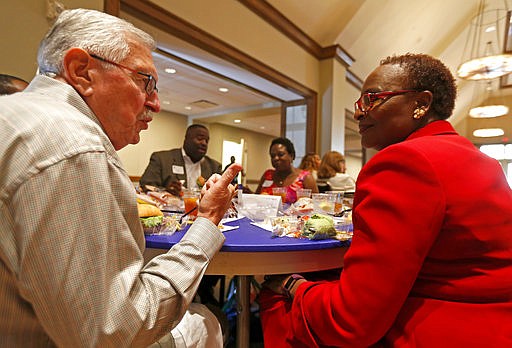DALLAS-We're often told to avoid talking about politics, race or religion at the dinner table.
But one Dallas organization, Project Unity, is encouraging people to do just that.
The Dallas Morning News reports on a recent Tuesday night, more than 150 people of various ethnicities came together as part of the Year of Unity efforts, created in response to the July 7, 2016, ambush in Dallas that left five police officers dead.
Previous Together We Dine events included city officials and college students. This event opened up the conversations to business people, nonprofit organizations and clergy.
Dozens of tables at Highland Park United Methodist Church became the setting where people talked about their upbringing, not being exposed to minority communities until adulthood, feeling concerned about today's political rhetoric, and the impact that the killing of five police officers last July had on the city.
These weren't the surface-level talks typically held when meeting a stranger.
"We are challenging people to engage in dialogue and activities that improve race relations," said the Rev. Richie Butler of St. Paul United Methodist Church, in an interview before the meal. Butler started Project Unity after the Ferguson, Missouri, police shooting. "Listen to someone else's story, learn and engage."
Facilitators helped guide the talks. They asked questions about the state of race relations, encounters with racism and feelings on stereotypes.
Dianna Masters, a pastor serving southern Dallas in the United Methodist Church of North Texas, said she felt that a lot of people believed race relations would get better with Barack Obama as the first black president.
"Whatever stereotype they had of black men, people saw a great example in someone that was a great dad, husband, leader," Masters said. Over dinner, she shared her concerns about the rise of white supremacy speech.
Jae Ellis and Liza Ellis, who live in Highland Park, said that the area gets a reputation for "being in a bubble," but that there's a real desire to change that perception.
"There was extreme respect in this room," Jae Ellis said. "Everyone has a good heart, but getting out of the comfort zone and talking about race isn't always easy."
"When one person reveals vulnerability, it makes others feel they can too," he said.
Butler said that when people listen first, action can follow in communities. The organization is planning a Together We Heal event July 15 for community members and police. It will include games and entertainment.

